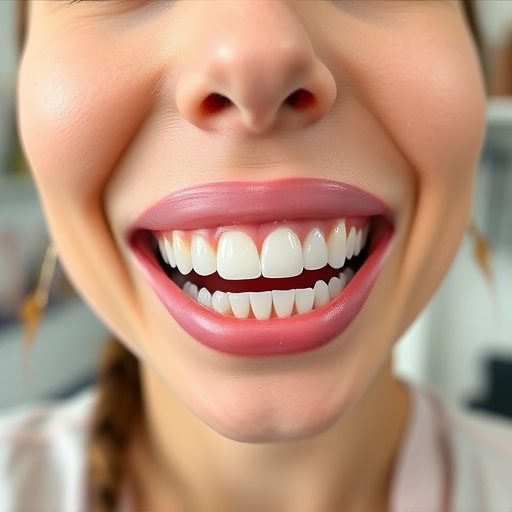Revolutionize Dental Care: Flexible Night Guards for Grinding Relief
A night guard for grinding teeth is a revolutionary tool in dentistry that combats bruxism by provid…….
In the ever-evolving industrial landscape, the concept of ‘night guard for grinding’ has emerged as a transformative force, promising enhanced efficiency and productivity in manufacturing and material processing. This comprehensive article aims to delve into the intricacies of this innovative practice, exploring its definition, global impact, technological underpinnings, economic implications, and the challenges it aims to address. By examining real-world applications and future trends, we will uncover how night guard for grinding is reshaping industries worldwide.
Night guard for grinding, in its essence, refers to the strategic deployment of automated systems or human guards during non-traditional work hours (typically overnight) to oversee and maintain grinding processes in industrial settings. Grinding, a vital manufacturing operation involving the abrasive reduction of materials, is susceptible to various issues when operated continuously during the day. These include equipment wear, operator fatigue, and safety hazards.
The primary objective of night guarding is twofold: first, to ensure uninterrupted production by minimizing downtime due to maintenance or unexpected interruptions; second, to enhance worker safety and well-being by reducing exposure to potentially hazardous grinding operations during regular working hours. This practice is particularly relevant in industries such as metal fabrication, automotive manufacturing, and construction, where precision grinding plays a critical role.
Historically, night guarding has evolved from traditional shift work practices, with the introduction of advanced automation technologies accelerating its development. Early forms involved manual monitoring, but modern approaches leverage computer-controlled systems and smart sensors to optimize performance and efficiency.
The concept of night guard for grinding has transcended geographical boundaries, gaining traction across diverse regions, each contributing unique perspectives and adaptations.
North American and European industries have been at the forefront of adopting advanced night guard systems. These regions have a long history of embracing automation, fueled by a combination of high labor costs and a commitment to improving productivity. In countries like Germany, known for its manufacturing prowess, night guard technology has become integral to maintaining competitive edge in global markets.
The Asia-Pacific region, particularly China and Japan, has witnessed a rapid surge in night guard for grinding adoption due to the following factors:
Emerging markets, such as India and Brazil, are also witnessing the implementation of night guard systems, primarily to address quality control issues and reduce product defects. While labor costs remain lower than in developed nations, these countries focus on investing in technology that enhances precision and consistency in grinding operations.
The economic implications of night guard for grinding are multifaceted, shaping the global manufacturing landscape.
According to a recent report by Grand View Research, the global industrial automation market size was valued at USD 78.9 billion in 2021 and is expected to grow at a compound annual growth rate (CAGR) of 7.6% from 2022 to 2030. Within this segment, night guard systems are projected to witness significant expansion due to their ability to optimize production processes and reduce operational costs.
Major industrial powers like the United States, Germany, and Japan are leading investors in automation technologies, including night guarding solutions. These countries recognize the long-term economic benefits of improved productivity, reduced waste, and enhanced product quality.
For manufacturers, the financial advantages of implementing night guard for grinding are compelling:
Technological innovations have been pivotal in shaping the capabilities and effectiveness of night guard for grinding.
CNC grinders are at the forefront of night guarding technology. These machines utilize computer-controlled axes to precisely grind materials, offering unparalleled accuracy and repeatability. CNC systems can be programmed to perform complex grinding operations, ensuring consistent quality during extended periods of operation.
The integration of smart sensors has revolutionized night guard practices. These sensors monitor equipment health in real time, detecting wear patterns, temperature fluctuations, and potential failure points. By analyzing data from these sensors, maintenance teams can proactively address issues, minimizing unplanned downtime.
AI-driven systems are emerging as game-changers in night guarding. AI algorithms can analyze vast amounts of operational data to identify patterns, optimize processes, and predict equipment failures. Machine learning models adapt over time, improving predictive maintenance capabilities and overall system efficiency.
RPA technology is being explored for its potential to augment night guard operations. RPA bots can handle repetitive tasks, such as data entry or basic monitoring duties, freeing up human guards to focus on complex decision-making and crisis management.
The development of night guard for grinding is not without regulatory considerations, with governments worldwide implementing policies to ensure safety, environmental protection, and fair labor practices.
Many countries have established comprehensive guidelines for workplace safety, including regulations specific to hazardous tasks like grinding. These standards dictate personal protective equipment (PPE) requirements, safe operating procedures, and training protocols for both human guards and automated systems.
Grinding operations can generate significant dust and noise pollution, prompting environmental agencies to impose strict emission control measures. Night guard facilities must adhere to these regulations, often employing advanced filtration systems and soundproofing to minimize their ecological impact.
Employers implementing night guard shifts must comply with labor laws regarding working hours, rest periods, and overtime compensation. Additionally, workers’ rights organizations advocate for fair treatment of night shift employees, including adequate break times and health monitoring.
Despite its numerous advantages, night guard for grinding faces several challenges and criticisms that require thoughtful consideration and strategic solutions.
One of the primary barriers is the high upfront cost of implementing automated night guarding systems. This includes purchasing advanced machinery, installing sensors, and retraining staff. Smaller manufacturers may struggle to justify these investments, especially in industries with volatile product demands.
Solution: Governments can offer incentives and grants to encourage adoption, while financial institutions can provide specialized loans for industrial automation projects.
As night guarding becomes more automated, there is a growing need for skilled technicians capable of maintaining and programming advanced systems. The existing workforce may require retraining to adapt to new technologies, posing a challenge in rapidly changing industrial landscapes.
Solution: Industry partnerships with educational institutions can develop specialized training programs, ensuring a skilled workforce to support night guard operations.
While automated systems reduce certain safety risks, they do not eliminate all hazards. Human guards still play a crucial role in monitoring and addressing complex situations. Critics argue that excessive reliance on automation may lead to reduced human oversight, potentially increasing long-term operational risks.
Solution: A balanced approach should be adopted, where automation handles routine tasks while human guards provide expert intervention during critical operations. Continuous training programs can enhance the skills of night guard personnel.
A leading Japanese automotive manufacturer implemented a comprehensive night guard system for its precision grinding operations. The facility operates 24/7 to meet global demand for high-quality auto parts. By deploying CNC grinders and smart sensors, the company achieved significant improvements:
A US-based metal fabrication company faced challenges with intermittent equipment failures and high maintenance costs. They adopted a night guard system featuring AI-driven predictive maintenance. The results were remarkable:
An Indian manufacturer of construction equipment utilized night guarding to address quality control issues with complex gear grinding operations. The implementation included robotic process automation (RPA) for repetitive tasks. The outcomes were positive:
The future of night guard for grinding is brimming with opportunities and potential disruptions, shaped by technological advancements and evolving industry dynamics.
The concept of smart factories, where all components are interconnected and data-driven, will dominate the manufacturing landscape. Night guard systems will become integral parts of these integrated networks, leveraging IoT (Internet of Things) technologies to optimize processes and facilitate real-time decision-making.
AI will continue to play a pivotal role in night guarding, with advanced analytics enhancing predictive maintenance and process optimization. Machine learning algorithms will adapt to new data, improving system performance over time.
Cobots, designed to work alongside human employees, are set to revolutionize night guard operations. These robots can handle tasks requiring precision and force control, freeing up human guards for higher-value activities. Cobot integration may lead to more flexible and efficient night guarding practices.
With advancements in telecommunications, remote monitoring of grinding operations will become more feasible. Expert systems, powered by AI, can provide real-time guidance to operators, even during non-traditional hours, ensuring consistent quality and safety standards.
Night guard for grinding has emerged as a transformative force within the manufacturing sector, addressing critical challenges related to productivity, safety, and efficiency. As industries worldwide embrace automation and smart technologies, this practice will continue to evolve, shaping the future of grinding operations. By leveraging advanced machinery, smart sensors, and data-driven insights, manufacturers can optimize their processes, reduce costs, and maintain a competitive edge in global markets.
Q: How does night guard for grinding impact employee schedules and labor relations?
A: Night guarding typically involves rotating shifts to cover non-traditional hours. Effective communication and fair scheduling practices are essential to maintain positive labor relations. Some employees may prefer these flexible shifts, while others might require adjustments to accommodate personal needs.
Q: Can night guard systems completely replace human guards?
A: While automation can handle many tasks, complete replacement of human guards is not recommended. Human oversight remains crucial for complex decision-making, crisis management, and ensuring safety in dynamic work environments. A balanced approach combines automated efficiency with human expertise.
Q: What are the environmental benefits of night guard for grinding?
A: Night guarding can optimize grinding processes, reducing energy consumption and material waste. Advanced filtration systems can minimize noise and dust pollution, contributing to a cleaner environment, especially in urban manufacturing hubs.
Q: How do I begin implementing a night guard system in my factory?
A: Start by assessing your current operations and identifying areas for improvement. Consult with industry experts and consider pilot projects to test different technologies. Develop a comprehensive plan, including investment strategies, employee training, and safety protocols, before full-scale implementation.

A night guard for grinding teeth is a revolutionary tool in dentistry that combats bruxism by provid…….

Sleep disorders like teeth grinding (bruxism) negatively impact overall health, causing jaw pain, he…….

Dental grinding (bruxism) causes significant oral issues like tooth wear, sensitivity, headaches, an…….